Eat this and ditch that to help prevent colorectal cancer
Some foods can help keep your colon healthy while others can up your risk of colorectal cancer.
Updated on February 23, 2023
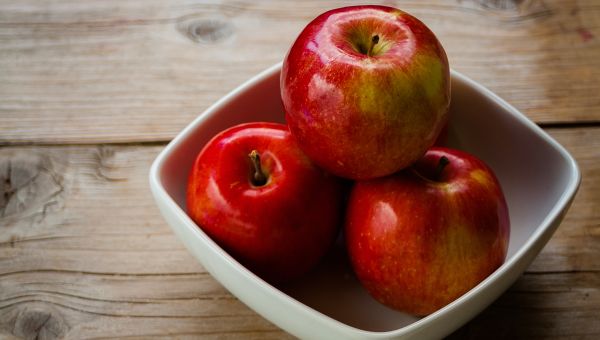
Colorectal cancer, which includes colon cancer and rectal cancer, is the second leading cause of cancer-related deaths in the United States, according to the National Cancer Institute. While some risk factors such as family history and age can’t be controlled, making a few lifestyle changes may help prevent the disease. Aside from exercising regularly, maintaining a… Show More
Colorectal cancer, which includes colon cancer and rectal cancer, is the second leading cause of cancer-related deaths in the United States, according to the National Cancer Institute. While some risk factors such as family history and age can’t be controlled, making a few lifestyle changes may help prevent the disease. Aside from exercising regularly, maintaining a healthy weight, and getting recommended screening tests, changing your eating habits can be another important step toward prevention. Find out which foods to add to your diet and which to limit or avoid for colon health.
Show Less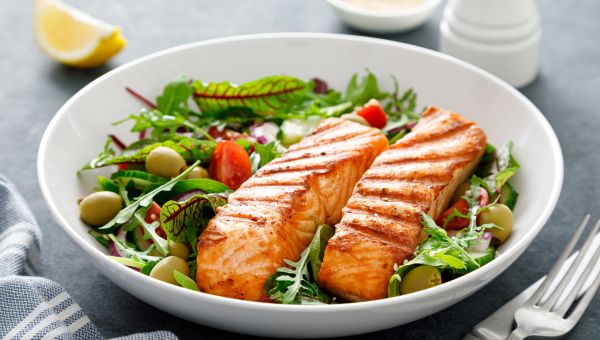
Eat: Fatty fish
Swap out the red meats and fried chicken for some seafood. Fatty fish, like salmon, is full of omega-3 fatty acids. Research suggests these healthy fats may help slow colon cancer growth and potentially reduce the development of colorectal tumors. While more research is needed to determine how big… Show More
Swap out the red meats and fried chicken for some seafood. Fatty fish, like salmon, is full of omega-3 fatty acids. Research suggests these healthy fats may help slow colon cancer growth and potentially reduce the development of colorectal tumors. While more research is needed to determine how big a role omega-3 fats play in reducing colon cancer risk, the American Institute for Cancer Research recommends eating 4-ounce servings of fatty fish twice a week. You don’t have to stick to salmon. Other fish high in omega-3s include trout, mackerel, and sardines.
Show Less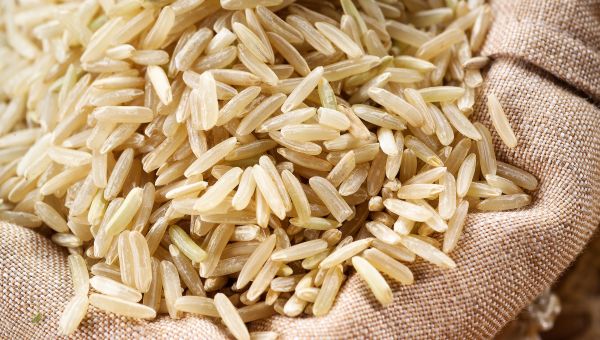
Eat: Whole Grains
A 2017 meta-analysis published in Cancer Epidemiology found that eating more daily servings of whole grains was associated with a lower risk of colorectal cancer. Previous research has linked brown rice in particular to a reduction in colon polyps, growths that can become cancerous. One reason why… Show More
A 2017 meta-analysis published in Cancer Epidemiology found that eating more daily servings of whole grains was associated with a lower risk of colorectal cancer. Previous research has linked brown rice in particular to a reduction in colon polyps, growths that can become cancerous. One reason why whole grains may help protect against colon cancer is that they are high in fiber, which helps clear toxins from the digestive tract.
Show Less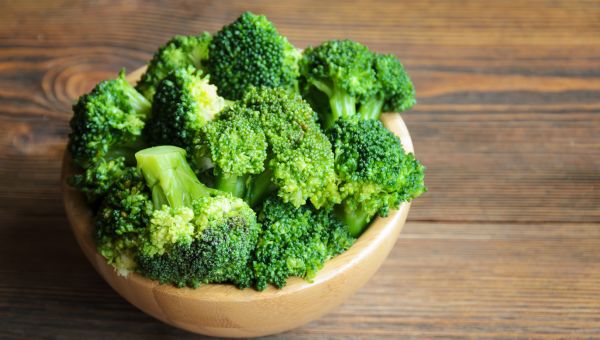
Eat: Cruciferous Vegetables
It’s not news that vegetables are an essential part of a healthy diet, but did you know they may benefit your colon? Studies have shown that eating several servings of veggies each day is associated with a lower colorectal cancer risk. One 2021 review published in JAMA Network Open, for example,&… Show More
It’s not news that vegetables are an essential part of a healthy diet, but did you know they may benefit your colon? Studies have shown that eating several servings of veggies each day is associated with a lower colorectal cancer risk. One 2021 review published in JAMA Network Open, for example, found that produce-heavy eating patterns—such as the Mediterranean diet and semi-vegetarian diets—were linked to a reduced incidence of the disease.
Cruciferous vegetables such as broccoli, cauliflower, cabbage, kale, Brussels sprouts, and arugula can also keep your gut healthy thanks to isothiocyanates, anti-inflammatory compounds that help turn on a gene that sweeps out cancer cells. Crunchy greens are also great sources of folate, and some research suggests that having high blood levels of this nutrient (also known as vitamin B9), is linked to a lower risk of colon cancer.
Show Less
Eat: Beans and Legumes
Legumes, a food group that includes beans as well as peas, lentils, chickpeas, and peanuts, may be especially colon-friendly. One 3.5-ounce daily serving of legumes was linked to a 21 percent reduced risk of colorectal cancer in an analysis of 29 studies published in 2022 in the European Journal of… Show More
Legumes, a food group that includes beans as well as peas, lentils, chickpeas, and peanuts, may be especially colon-friendly. One 3.5-ounce daily serving of legumes was linked to a 21 percent reduced risk of colorectal cancer in an analysis of 29 studies published in 2022 in the European Journal of Epidemiology. As with whole grains, legumes have hefty amounts of fiber, which may explain their cancer-preventing properties.
Show Less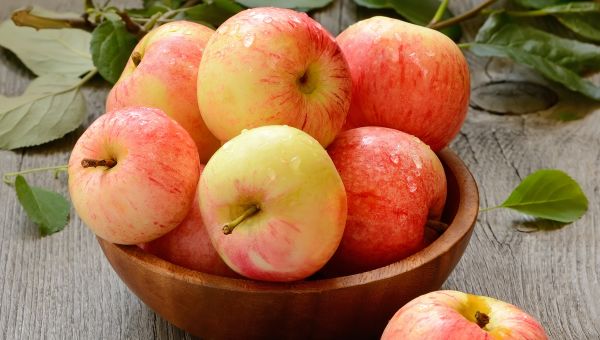
Eat: Fruits
Fruits are another no-brainer when it comes to healthy eating—but they’ve also been shown to protect against certain cancers. Research suggests that aiming for 200 grams or more of fruit each day (about the amount in one medium-sized apple), can help reduce the risk of colorectal cancer. Apples may… Show More
Fruits are another no-brainer when it comes to healthy eating—but they’ve also been shown to protect against certain cancers. Research suggests that aiming for 200 grams or more of fruit each day (about the amount in one medium-sized apple), can help reduce the risk of colorectal cancer. Apples may be particularly beneficial. Pectin, the fibrous part of the fruit, may produce compounds that protect colon cells. The antioxidants in apples may also help slow cancer cell growth.
Show Less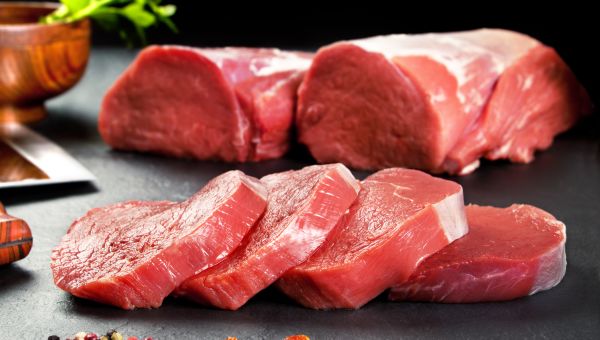
Ditch: Red and Processed Meat
Red meats (such as beef, pork, and lamb), and processed meats (such as bacon, sausage, and hot dogs) raise several dietary red flags, particularly for heart disease, given the high amounts of saturated fat and cholesterol they contain. Regular consumption of these protein sources has also been… Show More
Red meats (such as beef, pork, and lamb), and processed meats (such as bacon, sausage, and hot dogs) raise several dietary red flags, particularly for heart disease, given the high amounts of saturated fat and cholesterol they contain. Regular consumption of these protein sources has also been linked to a higher risk of colorectal cancer. This may be due to the preservatives in processed meat and the way the meat is often cooked. Grilling, charring, and other high-heat and open-flame cooking methods produce chemicals called heterocyclic amines (HCAs) and polycyclic aromatic hydrocarbons (PAHs). These compounds may contribute to DNA changes, which can increase cancer risk.
Show Less
Ditch: Alcohol
Drinking moderate to heavy amounts of alcohol is linked to an increased risk of colorectal cancer. This may have to do with the way alcohol is metabolized. A toxic byproduct called acetaldehyde forms when ethanol is broken down in the body. Acetaldehyde may damage cells and cause changes to DNA,… Show More
Drinking moderate to heavy amounts of alcohol is linked to an increased risk of colorectal cancer. This may have to do with the way alcohol is metabolized. A toxic byproduct called acetaldehyde forms when ethanol is broken down in the body. Acetaldehyde may damage cells and cause changes to DNA, which can lead to cancer.
Drinking alcohol may also trigger oxidation in the body, which can damage DNA, and it may prevent the body from absorbing essential nutrients—including vitamins A, C, D and E, as well as folate and carotenoids—that help protect the body against cancer.
If you don’t drink alcohol, don’t start. If you do, remember that moderation is key. Experts recommend that men limit themselves to two drinks per day, while the recommended limit for women is one drink per day.
Show Less
Schwingshackl L, Schwedhelm C, Hoffmann G, et al. Food groups and risk of colorectal cancer. Int J Cancer. 2018 May 1;142(9):1748-1758.
National Cancer Institute. SEER: Cancer Stat Facts: Colorectal Cancer. Accessed February 23, 2023.
National Cancer Institute. Colorectal Cancer Prevention (PDQ)–Patient Version. Updated June 10, 2022.
Volpato M, Hull MA. Omega-3 polyunsaturated fatty acids as adjuvant therapy of colorectal cancer. Cancer Metastasis Rev. 2018;37(2-3):545-555.
Song M, Lee I-M, Manson JE, et al. Effect of Supplementation With Marine ω-3 Fatty Acid on Risk of Colorectal Adenomas and Serrated Polyps in the US General Population: A Prespecified Ancillary Study of a Randomized Clinical Trial. JAMA Oncol. 2020;6(1):108-115.
Song M, Zhang X, Meyerhardt JA, et al. Marine ω-3 polyunsaturated fatty acid intake and survival after colorectal cancer diagnosis. Gut. 2017;66(10):1790-1796.
Tantamango YM, Knutsen SF, Beeson WL, Fraser G, Sabate J. Foods and food groups associated with the incidence of colorectal polyps: the Adventist Health Study. Nutr Cancer. 2011;63(4):565-572.
Lee JE, Willett WC, Fuchs CS, et al. Folate intake and risk of colorectal cancer and adenoma: modification by time. Am J Clin Nutr. 2011;93(4):817-825.
Chen Y, Li Y, Wang X-Q, et al. Phenethyl isothiocyanate inhibits colorectal cancer stem cells by suppressing Wnt/β-catenin pathway. Phytother Res. 2018;32(12):2447-2455.
Veettil SK, Wong TY, Loo YS, et al. Role of Diet in Colorectal Cancer Incidence: Umbrella Review of Meta-analyses of Prospective Observational Studies. JAMA Netw Open. 2021;4(2):e2037341.
Jin S, Je Y. Nuts and legumes consumption and risk of colorectal cancer: a systematic review and meta-analysis. Eur J Epidemiol 37, 569–585 (2022).
Lee J, Shin A, Oh JH, Kim J. Colors of vegetables and fruits and the risks of colorectal cancer. World J Gastroenterol. 2017 Apr 14;23(14):2527-2538.
Boyer J, Liu RH. Apple phytochemicals and their health benefits. Nutr J. 2004;3:5.
Brittany Ciupka. Can an Apple a Day Keep Cancer Away? National Foundation for Cancer Research. September 15, 2020.
American Cancer Society. Colorectal Cancer Risk Factors. Last revised February 1, 2023.
More On


video

article

slideshow


video


video
